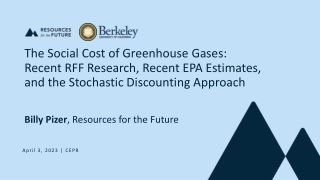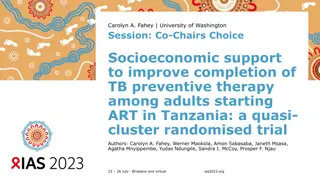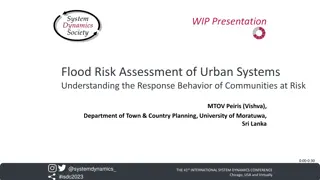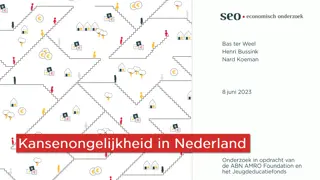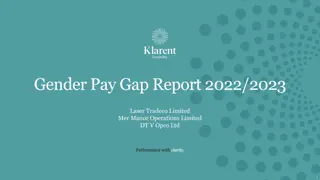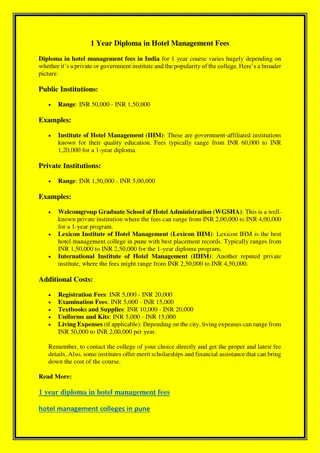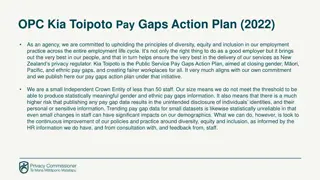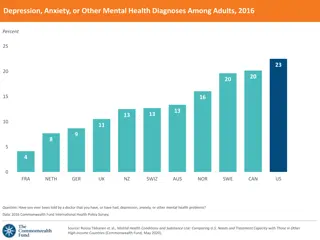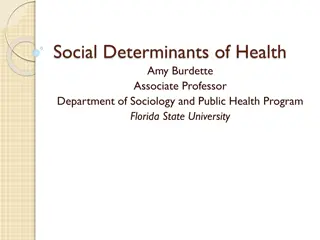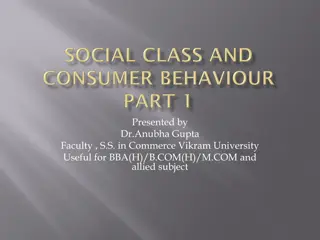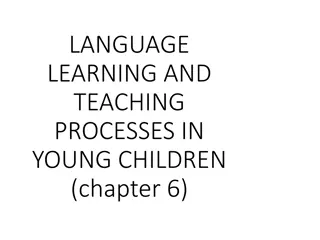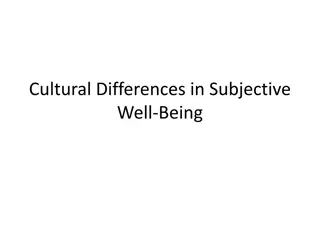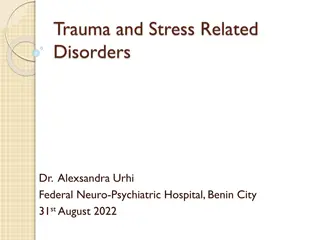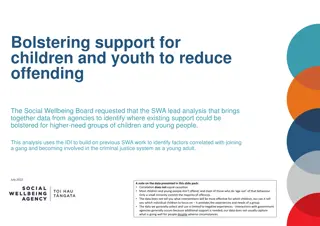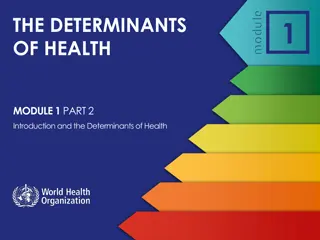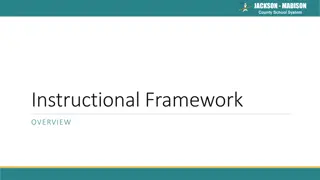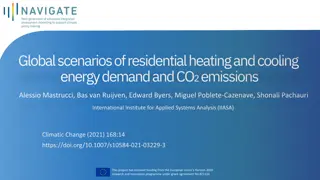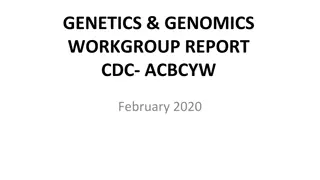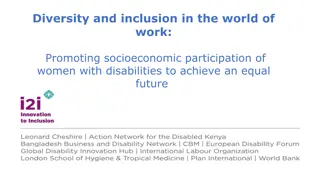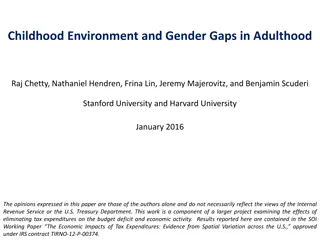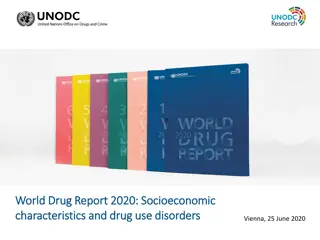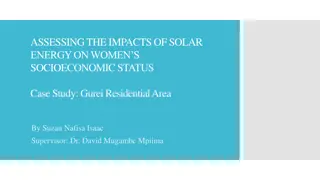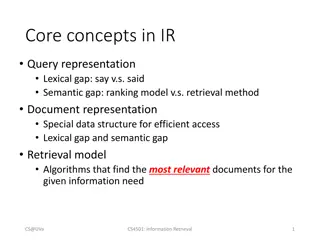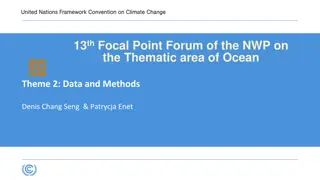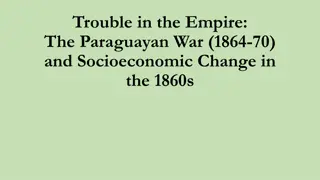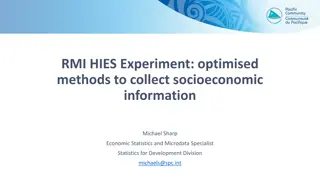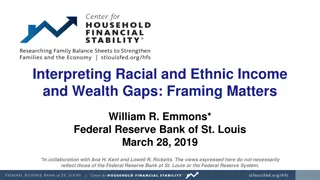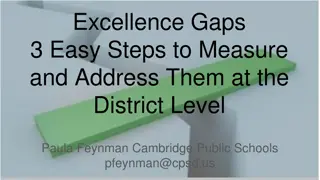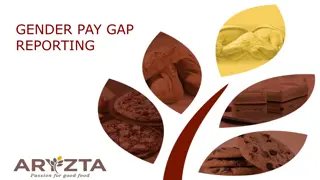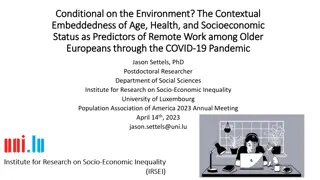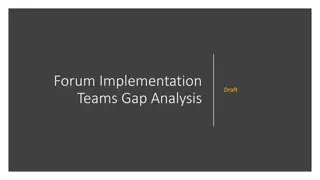Fostering Diverse Schools Demonstration Grants
Fostering Diverse Schools Demonstration Grants program, its priorities, and selection criteria in this pre-application webinar. Discover how to develop or enhance a comprehensive plan to increase socioeconomic diversity in schools and promote academic achievement.
0 views • 29 slides
Financial hardship and the economic burden of health [cancer] care
The financial hardships and economic burdens faced by individuals in cancer care, highlighting the impact of socioeconomic status and household financial insecurity. It also explores the association between financial hardship and various health outcomes.
1 views • 19 slides
Economic Framework for Greenhouse Gases: Recent Insights
A comprehensive analysis of the social cost of greenhouse gases, including recent RFF research and EPA estimates, using a stochastic discounting approach. Explore a modular framework for calculating the SCC and RFF Socioeconomic Projections on global CO2 emissions and economic growth. Learn about th
0 views • 17 slides
Climate Justice & Disadvantaged Communities: Environmental Issues in US EPA Region 2
Climate justice and the impact on disadvantaged communities are key environmental issues addressed by Adriana Espinoza, Deputy Commissioner for Equity & Justice in US EPA Region 2. The initiative identifies and prioritizes disadvantaged communities based on multiple criteria, including environmental
5 views • 18 slides
Enhancing Completion of TB Preventive Therapy with Financial Incentives
Study in Tanzania shows that financial incentives and targeted peer counseling increase completion of isoniazid preventive therapy among ART initiates. Providing short-term socioeconomic support benefits TB prevention efforts and improves outcomes for individuals with HIV. Effective strategies may i
1 views • 14 slides
Understanding Urban Flood Risk and Community Response Behavior
Flood risk assessment in urban systems involves complex interactions among natural, physical, and social elements. Factors such as population vulnerabilities, disparities in socioeconomic status, and post-disaster recovery challenges impact how communities respond to flood events. This research expl
3 views • 4 slides
Impact of Socioeconomic Factors on Childhood Development
Children's development and academic success are influenced by socioeconomic factors, as highlighted in a recent study. The research reveals disparities in access to resources and opportunities among children, impacting their educational outcomes and overall well-being. Initiatives like the Youth Edu
3 views • 43 slides
Klarent Hospitality Gender Pay Gap Report 2022/2023 Overview
Klarent's Gender Pay Gap Report for 2022/2023 reveals insights into gender disparities in pay at Laser Tradeco Limited and Mer Manor Operations Limited. The report discusses hourly pay gaps, bonus pay gaps, and the distribution of male and female employees across pay quartiles. Despite challenges fa
8 views • 9 slides
1 Year Diploma in Hotel Management Fees
The 1-year diploma in hotel management fees at Lexicon Institute of Hotel Management are sufficiently inexpensive to enable students from all socioeconomic situations to pursue post-12 affordable education. It provides two hotel management diploma programs: the Advanced Diploma in Hospitality Studie
0 views • 1 slides
OPC Kia Toipoto Pay Gaps Action Plan 2022 Summary
The OPC Kia Toipoto Pay Gaps Action Plan 2022 outlines the agency's commitment to diversity, equity, and inclusion in employment practices. Despite limitations in data due to the small staff size, the agency focuses on continuous improvement in policies informed by HR information and staff feedback.
1 views • 6 slides
Mental Health Insights Among High-Income Countries Adults in 2016
Explore the prevalence of depression, anxiety, emotional distress, and socioeconomic needs among adults in high-income countries based on the 2016 Commonwealth Fund International Health Policy Survey. The data highlights the rates of mental health diagnoses, subjective experiences of emotional distr
1 views • 10 slides
Understanding Social Determinants of Health
Chronic conditions like heart disease and cancer have multiple causes, not all biological. Social epidemiology studies the social distribution of health, morbidity, and mortality risk influenced by social status and conditions. Factors such as age, gender, race, socioeconomic status, and social cond
0 views • 32 slides
Understanding Social Class and Consumer Behavior
Explore the concept of social class and its impact on consumer behavior across different socioeconomic groups. From subjective to objective measurements, learn how lifestyle choices vary between upper class elites, high-level professionals, and the middle class. Discover how social class influences
0 views • 11 slides
Language Learning and Teaching Processes in Young Children
Development of language in young children is influenced by various factors such as their cultural and linguistic environment, unique characteristics, and interactions with adults. Optimal language development requires language stimulation from the environment. Varied cultural practices impact langua
1 views • 51 slides
Cultural Contrasts in Subjective Well-Being: Factors and Values
Societies exhibit varying levels of well-being influenced by factors such as wealth, stability, and culture. Economic development, social stability, and individualist-collectivist values play crucial roles. Broad socioeconomic indicators like GDP and life expectancy impact well-being significantly.
1 views • 49 slides
Understanding Trauma and Stress-Related Disorders: A Comprehensive Overview
Trauma and stress-related disorders encompass maladaptive responses to severe stress, affecting social functioning. This article delves into classifications, specifically PTSD, emphasizing clinical presentation and management. It explores ICD-10 and ICD-11 coding, defining PTSD and its essential fea
0 views • 30 slides
Analyzing Support for At-Risk Children and Youth to Reduce Offending
The Social Wellbeing Board has tasked the SWA with analyzing data to enhance support for high-need children and young people to prevent offending. Recent statistics show a significant increase in youth crime in Auckland, potentially linked to COVID-19 impacts. Prior research highlights factors like
0 views • 8 slides
Understanding the Determinants of Health: Exploring Factors Influencing Well-being
Explore the intricate web of factors affecting health and well-being, from socioeconomic and environmental influences to genetic predispositions. Learn about the social determinants of health and their impact on individual and population well-being. Gain insights into why framing health in societal
0 views • 16 slides
Jackson-Madison County School System Instructional Framework Overview
The Jackson-Madison County School System is focusing on a research-based plan to improve instruction in every classroom. Their priorities include curriculum, lesson structures, and authentic literacy. By emphasizing these aspects, they aim to provide quality education across all socioeconomic backgr
0 views • 37 slides
Global Scenarios of Residential Heating and Cooling Energy Demand
This study presents global scenarios of residential heating and cooling energy demand and CO2 emissions, focusing on the evolution of building stock, energy demand, and emissions for space heating and cooling. The research aims to address the limitations in current global scenario studies by develop
8 views • 5 slides
Understanding Plea Bargaining in Criminal Cases
Plea bargaining is a negotiation process where the accused admits guilt in exchange for a reduced punishment. It helps in resolving cases faster and reducing court congestion. The concept is applicable to cases with a maximum sentence of 7 years, not involving women or children under 14, and not imp
2 views • 14 slides
Understanding Challenges and Gaps in Genetic and Genomic Testing for Breast Cancer Risk
The report highlights current challenges and identified gaps in genetic and genomic testing for breast cancer risk assessment. The workgroup aims to catalog existing materials, address terminology confusion, and improve public and clinician education. Challenges include complex terminology, uncertai
0 views • 21 slides
Addressing Education Gaps for Missouri's Workforce Development
This research presentation discusses the current challenges and opportunities in closing education gaps in Missouri, focusing on workforce development needs, collaborations among stakeholders, and initiatives to support students and teachers. Key areas include understanding degree attainment trends,
0 views • 30 slides
GAIA-CLIM Online Catalogue of Gaps: Identification, Assessment, and Impacts
The GAIA-CLIM project focuses on identifying, assessing, and addressing gaps in climate data. Through a collaborative approach involving project members, user workshops, and a living document, the project aims to categorize gap types, interact with gap owners, and formulate SMART actions for remedyi
1 views • 21 slides
Promoting Socioeconomic Participation of Women with Disabilities for an Equal Future
In the world of work, diversity and inclusion play crucial roles in promoting socioeconomic participation of women with disabilities to achieve an equal future. This webinar focuses on understanding the gender dynamics, power relations, and barriers faced by women and men with disabilities in econom
0 views • 20 slides
Understanding Social Gradients in Health and Socioeconomic Status
This presentation delves into the complexities of social gradients in health and socioeconomic status, highlighting the impact of indicators such as employment status, education, poverty, and housing tenure. It emphasizes the need to reassess indicators used for determining socioeconomic status and
2 views • 7 slides
Understanding Planned Gaps in TEAMS Version 3.8
TEAMS Version 3.8 introduces the concept of Planned Gaps, allowing participants to prevent automatic exits by entering periods without qualifying services. Learn how to enter and manage Planned Gaps effectively to support continued enrollment in the AEL program. Discover the importance of aligning P
0 views • 33 slides
Impact of Childhood Environment on Gender Gaps in Adulthood
Gender gaps in adulthood, particularly in earnings and employment, have been extensively studied. This paper explores how childhood environment influences these gaps, showing that boys from poor families are less likely to work than girls. The study reveals that gender gaps vary across different are
0 views • 44 slides
Impact of Socioeconomic Conditions on Drug Use Disorders: Insights from World Drug Report 2020
The World Drug Report 2020 highlights the strong correlation between socioeconomic factors and drug use disorders. Studies reveal that communities facing poverty, violence, and social inequality are at a higher risk of drug overdoses and addiction. Factors like income inequality, lack of social capi
1 views • 17 slides
Impacts of Solar Energy on Women's Socioeconomic Status: Case Study in Gurei Residential Area
Globally, women face challenges due to lack of access to modern energy, impacting their socioeconomic status. This research in Gurei, South Sudan, aims to assess the effects of solar energy on women's lives, addressing issues of clean energy access, cultural barriers, and women's involvement in the
0 views • 7 slides
Understanding Core Concepts in Information Retrieval: Lexical and Semantic Gaps, Retrieval Models, and Algorithms
Explore the core concepts in Information Retrieval (IR) including lexical gaps like 'say' vs. 'said', semantic gaps, ranking models vs. retrieval methods, special data structures for efficient access, and algorithms for finding relevant documents. Understand the differences between IR and databases,
0 views • 46 slides
Addressing Knowledge Gaps and Needs in Ocean Data and Methods for Climate Change Adaptation
The 13th Focal Point Forum of the NWP focuses on the thematic area of Ocean Theme 2: Data and Methods, highlighting challenges in accessing reliable data for forecasting marine-climate extremes and assessing adaptive capacity. Knowledge gaps exist in essential ocean variables, hindering evidence-bas
0 views • 5 slides
Socioeconomic Transformations and the Legacy of the Paraguayan War (1864-70) in Brazil
The content delves into the turbulent times of the Paraguayan War and its aftermath in Brazil during the 1860s. It explores the socioeconomic changes, political dynamics, and demographic shifts that shaped the era, highlighting the impact of the war on Paraguay and the region. The narrative unfolds
0 views • 12 slides
Optimised Methods for Collecting Socioeconomic Information in the Pacific Region
This presentation explores the optimised methods used in the Republic of the Marshall Islands Household Income and Expenditure Survey (RMI HIES) to collect socioeconomic data. It covers the objectives and history of HIES in the Pacific, the standardised methodology implemented since 2012, and detail
0 views • 57 slides
Understanding Racial and Ethnic Income Disparities
This piece delves into the income and wealth gaps among different racial and ethnic groups, emphasizing the importance of framing when analyzing such disparities. It presents data from the Federal Reserve's Survey of Consumer Finances, highlighting the slower closure of income gaps for Black and His
0 views • 16 slides
Addressing Excellence Gaps in Education
Explore a three-step process to measure and address excellence gaps at the district level in education, focusing on defining the excellence gap, inspiring action, and bridging the gap using a Response to Intervention (RtI) model. Learn about the disparity in academic performance between marginalized
0 views • 18 slides
Gender Pay Gap Reporting Analysis
Analysis of gender pay gap reporting data reveals disparities in mean and median hourly remuneration gaps and bonus remuneration gaps between male and female employees. The findings also include insights on pay gaps in part-time and temporary positions, as well as percentages of employees receiving
0 views • 8 slides
Conditional on the Environment? The Contextual Embeddedness of Age, Health, and Socioeconomic Status as Predictors of Remote Work among Older Europeans through the COVID-19 Pandemic
This study delves into how the COVID-19 pandemic has influenced remote work patterns among older Europeans, focusing on the interaction between age, health, socioeconomic status, and contextual factors. It explores the impact of government restrictions, education, income, age, and health on the abil
0 views • 24 slides
Enhancing National Education Policies: Bridging Gaps and Recommendations
The presentation focuses on bridging gaps in the National Education Policy 2009 and aligning it with NEP 2015. It highlights key policy actions, gaps in implementation, and recommendations to improve literacy rates, develop curriculums, mainstream non-formal education, and allocate budgets effective
0 views • 14 slides
Draft - Early Thinking on Gaps in Food Insecurity Implementation
The draft outlines early thinking on gaps in food insecurity implementation, focusing on expand produce purchasing initiatives and prioritize Washington-grown products. Recommendations include actions to increase purchasing power at the county level and boost participation in nutrition programs. Fun
1 views • 34 slides

![Financial hardship and the economic burden of health [cancer] care](/thumb/779/financial-hardship-and-the-economic-burden-of-health-cancer-care.jpg)
